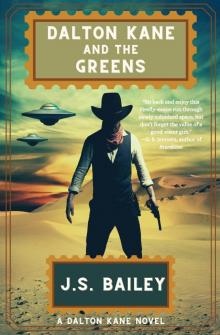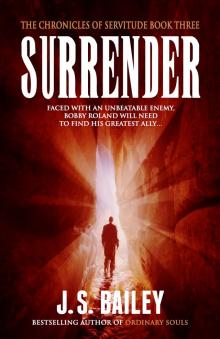- Home
- J. S. Bailey
Dalton Kane and the Greens Page 2
Dalton Kane and the Greens Read online
Page 2
“Cut myself!”
“You’ll need to stem the bleeding while you wait for the medics to get there. Where is your cut?”
“Hand—was peeling an avocado, and the knife slipped. Oh, God! What if I die?”
Cadu’s black hair stood up in a tuft where he’d already run a hand through it, and his dark brown skin glistened with sweat as he very calmly walked the man through what he needed to do.
Dalton did not envy Cadu his job.
He let himself into his already-stifling office, where he picked up his Mega Tough crossword puzzle book and continued where he’d left off the day before.
At half past ten, there came a knock on his door. “What is it?” he called, and a chagrined-looking Cadu poked his head around the corner.
“Another call just came through on the emergency line,” Cadu said. “They said there’s a salesman handing out pamphlets in the town square.”
Gurmeet had been right about one of the new arrivals. “What’s he selling?” Dalton asked, thinking of air conditioners. He mopped a trickle of sweat off his forehead with the sleeve of his trench coat.
“I don’t know, but he has quite a few people upset. You’d better check it out before he ends up on the roof like the other guy.”
Dalton rose and jammed his Stetson over his sunburned ears. “Consider it done.”
The town square lay six blocks from the police station. On his way there, Dalton rehearsed what he planned on saying to the newcomer: Richport has a No Solicitation ordinance, established to protect all salespeople and citizens alike, so please stop selling whatever it is you’re selling.
Shouts up ahead alerted Dalton to the salesman’s precise location. He shoved his way through the gathered throng and spotted a gangly South Asian man wearing khaki slacks and a pale pink dress shirt, amiably conversing with Alma Vaidya, one of the book club atheists who met at Slim’s Café every Thursday evening at eight.
Alma, a stocky woman in her fifties, leveled a glare at the man that would have made warriors tremble in their boots. “I have no need for anything you’re trying to sell.”
The salesman appeared in no way deterred. “Our tanning beds come with the best new features,” he went on in a smooth English accent as an apple core sailed through the air and hit him in the shoulder. “They have an internal cooling system to keep you comfortable while you tan, and they even have built-in satellite radio.”
“Why in the bloody hell would anyone in Richport need a tanning bed?” cried Henry Halpern, Dalton’s barber, lurking close by. “Richport is a tanning bed!”
“Our tanning beds allow one to tan comfortably from the comfort of one’s own home,” the salesman said calmly.
Dalton stifled a snort. “Excuse me,” he said, shoving past a few more people who stood blocking his way.
He reached the salesman and cleared his throat. “You. Newcomer.”
The salesman turned and brightened, no doubt believing Dalton had some interest in his wares. “Why, hello there! I’m Chumley Fanshaw, from Sunspotz Tanning Beds. So great of you to come out here today!”
Chumley thrust a business card into Dalton’s hand. He glanced down at it and read to himself: Chumley Fanshaw, purveyor of fine tanning beds from Sunspotz. Look great, feel greater!
An electronic address had been printed across the bottom. Dalton slid the card into his pocket in case he’d have to use it as evidence in a trial for Chumley’s future murderer.
“You’ve gathered quite the crowd here,” Dalton commented.
“Oh, I know.” Chumley’s cheeks flushed as if he were impressed by his own feat. “I didn’t expect such a response.”
“You realize most of them probably want to kill you.”
“Kill me?” Chumley brought a hand to his chest. “Why would they do that?”
“You’ve never been in Richport before, have you?”
“This is my first time on Molorthia Six. It’s kind of an odd planet, isn’t it?”
Dalton kept his tone guarded as he said, “What makes you say that?”
Chumley scratched the back of his neck, which was probably already starting to blister since he didn’t have a hat. “It’s just that most colony planets settle the temperate zones, but all the settlements on Molorthia Six are in the equatorial desert. It certainly would have made my job easier, having cities farther south or north.”
Dalton clapped him on the shoulder. “I think you should research your markets a little better before spending a fortune on spacefare. Now I’m afraid you’ll have to stop what you’re doing, because solicitation happens to be against the law here in Richport.”
“Oh.” Chumley’s lips formed a disheartened frown. “Is that right?”
“I’m the sheriff. It’s right.”
“What should I do, then? Set up a pop-up shop and sell tanning beds from there?”
“I think,” Dalton said, “you’d better pack your bags and head somewhere else. Molorthia Eight is covered in ice.”
“Isn’t Molorthia Eight uninhabited?”
“It won’t be if you go there.”
Before Chumley could muster a reply, the comm unit clipped to Dalton’s belt let out a squawk. “Dalton?”
He fumbled with it a moment and held it to his ear. “Cadu? What is it?”
“It’s the Greens, sir,” Cadu said, as evenly as if he were imparting the weather. “They’ve just invaded Falcon Ranch.”
The comm nearly slipped through Dalton’s sweaty fingers. “Invaded?” His voice came out in a croak.
“Can you make it out there, or do you need me to send someone else?”
Dalton patted for the water pistol hanging from his hip, and swallowed. “I’ll go,” he heard himself say. To Chumley, he said, “Book the next shuttle out of here. I don’t want to scrape what’s left of you off the hardpan.”
Chumley’s mouth gaped open in an O. Dalton turned on his heel and dashed back toward the police station through the surprised throng as fast as if a Green were chasing him.
Two rust-colored quads with deep-tread tires had been parked behind the station. One had a dead battery, and the other just barely growled to life when Dalton thrust a key into its ignition. It gave a lurch before gliding smoothly forward, and he slapped the siren button so all the nincompoops still clogging the town square would get out of his way before they turned into life-sized bowling pins.
He breezed past an alarmed Chumley Fanshaw, who still hadn’t taken Dalton’s advice and left.
The edges of Richport soon gave way to rocky, reddish-tan sand that swirled up from the desert floor in plumes to mark Dalton’s passage. None of the roads on Molorthia Six were paved, and since Falcon Ranch lay somewhat off the beaten path, Dalton opted to eschew the road altogether and shot off in a northwesterly direction approximating the shortest distance between the ranch and the town.
He sped past the Lady Liberty rock formation, which looked a bit like a statue holding a torch if you imagined hard enough. At its base lay a few scattered bronze boomstones the wind had uncovered—he’d have to get a team out here to collect the explosive minerals before someone blew themselves up being stupid.
Off to the north, plumes of smoke rose into the air from below the horizon, just like Carolyn had said.
More smoke lay dead ahead, coming from Falcon Ranch.
He gritted his teeth. It was times like this when he wished their police force was bigger than just him, Cadu, and a handful of unqualified volunteers who came and went with the wind. How could he, one miserable man, fight back against the Greens and win, especially when he’d fainted the day before just from seeing Debbie’s lunch?
Her lunch had taken him by surprise, though. This time, he came prepared.
The main ranch house came into view past a low ridge—an adobe structure of ample size that made Dalton’s own house l
ook like a pillbox. A pasture full of lavender-colored grass, watered via an underground aquifer, was populated with several dozen field beasts swishing their tails in agitation.
Smoke rose from several singed clumps of desert scrub smoldering near the barn, one of those rare Molorthian structures built of imported wood that would have cost the builder a fortune. Doris Kelso, the stocky owner of Falcon Ranch, stood with her back pressed against the barn’s outer wall, gripping a smoking flamethrower in one trembling hand.
The quad threw up a spray of pebbles and dirt as Dalton ground it to a standstill, and he vaulted from it with his water pistol clenched tightly in his fist.
“Oh, Sheriff, thank God you’re here,” Doris said, looking strangely unrelieved in spite of his timely arrival. “I called as soon as I saw them coming, and then—”
“Where are they now?” Dalton saw nothing leafy and emerald-colored in their vicinity, but that didn’t mean the Greens weren’t being furtive.
Doris pointed toward the southwest. “They were heading that way, across open ground toward the Rosa.”
“How many?”
“Four; two tall and two shorter. They . . . ” She swallowed. “They vaulted the pasture fence and drank from the beasts’ trough, then gathered up fistfuls of grass and shoved it into some sacks. They even scooped extra water into what looked like canteens, if you can believe it.”
Dalton’s insides felt colder than the ice fields of Molorthia Eight. “You’re sure there were only four.”
“I’m positive. But Sheriff, what does it mean? Is my ranch going to be some sort of . . . of rest stop for those things?”
Instead of answering, he regarded once more her flamethrower, and then the smoldering patches of desert scrub. “You fired at them,” he said. “Did they seem . . . frightened?”
“Only a little. They seemed more concerned about replenishing their supplies.”
Dalton was about to say more when a faint swishing sound reached his ears.
His heart nearly stopped mid-beat.
“Sheriff?” Doris asked, eyes widening in alarm.
“Get inside,” he hissed. “Now!”
Doris didn’t need to be told twice. She launched herself from the barn’s shadow, seized Dalton’s free hand, and nearly tore his arm out of its socket hauling him toward her back door, which she threw open and then slammed shut and bolted once they were both safely inside.
Dalton got down on his hands and knees and peered slowly above the nearest windowsill, still gripping his water pistol. The window gave him the perfect view of the pasture, which would have looked idyllic on any other occasion.
“Doris?” he whispered. “Where are the other people who work here?”
“I gave them the day off,” she said in a low voice. “They’re at the water park in Pleasant Springs. They won’t be back until nightfall.”
“Good,” he said, and continued to watch and wait. Doris poked her head up beside his. It was sort of nice having the company. He’d never wanted to die alone.
Soon, a four-meter-tall being shuffled into view from the right, and Dalton nearly let out a shriek. He’d never even seen one that big before. Its forest-colored legs were as thick and sturdy-looking as the trunks of Earth trees, and its two sets of arms ended in hands sprouting rows of emerald, twig-like fingers that looked flimsy but had the strength to peel the roof off a car. Leaves sprouted from the whole length of its body much in the way that scales grew from a minnow.
The creature’s four eyestalks protruded from the top of its leafy head, surveying its surroundings as it drew to a stop next to the pasture fence. Some sort of primitive canvas sack had been slung over one of its shoulders, and the creature pulled it open and withdrew an earthy-brown canteen like the ones Doris had mentioned before.
“Should we kill it?” Doris hissed.
“Wait,” Dalton said, hardly daring to blink.
The creature stepped over the pasture fence as if it were a man stepping over a paving stone. It knelt down and stuck its face into the trough to drink, and once it had its fill, it dunked its canteen into the water and screwed the cap back on.
Then it rose, turned, and faced the herd of mooing field beasts, which might have been called cows had they lived on Earth, except for the fact they’d been genetically-modified to survive the harsh desert climate and now grew to half the size of normal cows and ate only the lavender grass.
Dalton slid Doris’s window open about three centimeters, then shoved the barrel of his water pistol through the gap.
“Water won’t hurt them, Sheriff,” she said to him.
He grunted. “It’s not water.”
“Then what—”
The creature lunged at the nearest field beast with lightning-quickness and seized it in its four arms. The field beast let out a bone-chilling squeal as the creature sank its two rows of razor-sharp fangs into its neck.
The poor thing started to struggle but immediately went limp.
Dalton aimed his water pistol at the creature and squeezed the trigger.
The pressurized jet of liquid shot outward in a fifteen-meter line, which splattered against the creature’s back.
It let out a roar, dropped the dead field beast, and whirled to face the house, its eyestalks glowering with murder as it spotted Dalton and Doris peeking above the windowsill.
It charged, blood dripping from its mandibles.
Dalton sprayed the rest of his ammo into the creature’s face, if you could call it a face. The creature roared again as it went down, its leafy flesh already dissolving into a chartreuse sludge.
Within sixty seconds, it stopped moving.
“It’s weed killer,” Dalton said.
He shoved the empty water pistol back into its holster and spoke into his comm unit. “Cadu? This is Dalton, calling in from Falcon Ranch.”
His voice sounded calm. Too calm, which meant he was probably going into shock, or something just as horrible.
“Yes?” came Cadu’s voice.
“Send out as many people as you can with reinforced fencing. They’re using Falcon Ranch as a rest stop.” He scrunched his eyes shut, hating the truth of the matter. “The Greens are on the move.”
Chumley Fanshaw settled back on the divan in his room at Hotel Richport, the town’s poshest place of lodging, sipping on a glass of champagne he’d had room service bring up to him with his dinner. After he’d showered the desert grit out of his hair and off his skin, he’d slipped into his favorite silk dressing gown, which felt so much nicer than having a layer of sand plastered to his body.
He really ought to have picked a different name to use here, since he was hiding. Call himself Bill, or Curtis, or Sanjay, or something. He still had time to come up with an alias, probably, but would he even remember to respond to it?
He set down his glass and refocused his attention on the guidebook he’d purchased at the town’s small spaceport upon his arrival. For a guidebook about the whole planet, it didn’t say much. The number of human residents living on Molorthia Six numbered close to a hundred thousand, which amounted to the population of a small city on Pelstring Four, but it made sense, given that Molorthia Six had been colonized for only a century.
The guidebook displayed a map of the planet’s nine cities—Richport, Paris, Pleasant Springs, Acropolis, Mount Olympus, Washington, New New Delhi, Cloud City, and Fred—and listed a few other notable sites, such as caverns, hot springs, and unique rock formations shaped like various aspects of the human anatomy. There was no unified government among the cities, which sprawled out across a thousand miles of equatorial desert; but there did seem to be two unofficial “provinces” imaginatively-named “East Desert” and “West Desert.”
Richport, Paris, and Pleasant Springs were located in East Desert Province. Perhaps the other two towns would be more accepting of tanning beds, and if
not, he could book a transport that would take him across the rocky sands to the other province.
A person had to make a living somehow, especially when one was on the run and in need of funds.
When Chumley grew bored of the guidebook, he lay it down on the table and moved toward the window, champagne glass in hand.
Chumley peered down at the quiet, unpaved street, adjusting his dressing gown to make sure he remained decent. A few solar-powered outdoor lights had flickered on in the past hour, and in their soft glow, he could see townsfolk making their way toward the pub where he’d first begun passing out business cards and brochures.
He still couldn’t understand why they’d taken so unkindly to him, but he supposed it came with the territory. These people would be close-knit, and he was a stranger to them, which meant he’d just have to get to know them better and instill in them a sense of trust before he tried Round Two.
While he continued to watch the ground, a tall, furtive shape down below him drifted from one shadow into another, and when Chumley tried to get a better look at it, it had gone.
It had seemed too tall for a typical man, and moved in a manner most alien.
He stared down at the remaining champagne in his glass, frowned, and swallowed the rest of it, then went to the room’s sideboard and poured himself another.
Lying on the divan once more, Chumley’s tired brain continued to stew in an alcohol-induced haze. Molorthia Six . . . he’d learned about it in school like all the other kids as part of the required unit about colony worlds. The colony on Jeptune Three, for example, was scattered across a chain of fertile islands since that planet boasted no larger land masses. Killian Six’s colony had to build reinforced homes due to frequent, violent earthquakes.
There had been something unique about Molorthia Six, too, but he couldn’t put a finger on it. Was it a vicious monsoon season? No, that was Orbus Prime. So maybe it was—
A short-lived scream carried up from the ground floor, derailing his train of thought.
Chumley sat up, blinking.
Pounding footsteps followed another scream.

 Dalton Kane and the Greens
Dalton Kane and the Greens Sacrifice
Sacrifice Servant
Servant Rage's Echo
Rage's Echo Ordinary Souls
Ordinary Souls Surrender
Surrender